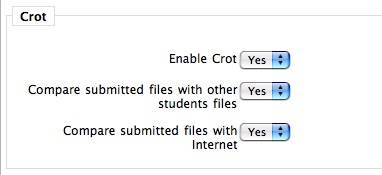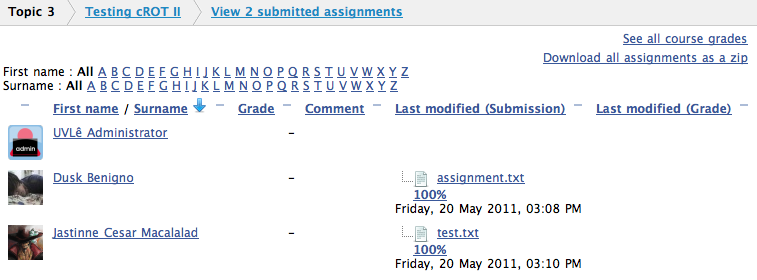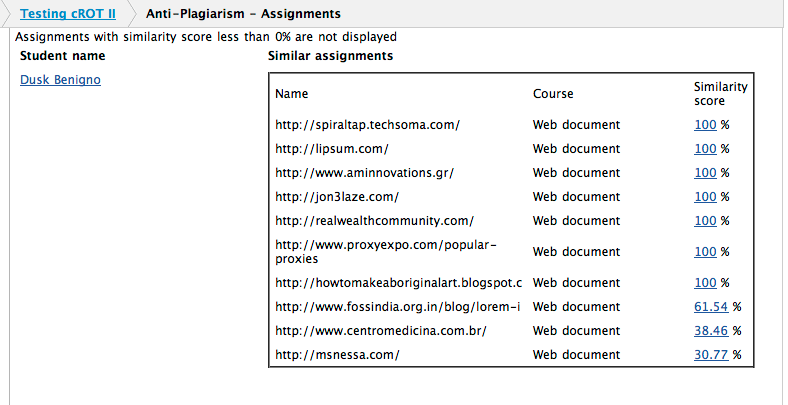How to detect plagiarism: Difference between revisions
mNo edit summary |
|||
| Line 13: | Line 13: | ||
This output is accessible under the option to view submitted assignments on your UVLe course page. If you click on the highlighted percentages, the sources of similarities are revealed like this<br /> | This output is accessible under the option to view submitted assignments on your UVLe course page. If you click on the highlighted percentages, the sources of similarities are revealed like this<br /> | ||
[[Image:Crot_output_-_similarities.png|center]]<br /> | [[Image:Crot_output_-_similarities.png|center]]<br /> | ||
Whenever possible, request plain text (.txt) submission, .doc file or pdf rather than .docx to get more reliable search results. The plagiarism detection engine on UVLe is run hourly. <br /><br /> | Whenever possible, request plain text ('''.txt''') submission, '''.doc''' file, '''.rtf''' or '''pdf''' rather than .docx to get more reliable search results. The plagiarism detection engine on UVLe is run hourly. <br /><br /> | ||
As the engine searches all files submitted on UVLe, more submissions from different courses across academic disciplines should improve the reliability of UVLe's plagiarism detection tool. | As the engine searches all files submitted on UVLe, more submissions from different courses across academic disciplines should improve the reliability of UVLe's plagiarism detection tool. | ||
Revision as of 10:42, 28 May 2011
To detect plagiarism, look for signs of an intellectually dishonest work or use plagiarism detection tools below.
Signs of an Intellectually Dishonest Work
- differences in writing style and vocabulary between an earlier work and the recently submitted assignment
- amount and complexity of output don't seem to reflect the time limitation
Tools to detect plagiarism
Before using any of these tools, know the substantive issues in plagiarism. There are potentials for misuse or abuse of these tools.
On UVLe
- Use Crot Tool for Plagiarism Detection. It helps teachers detect plagiarized materials that students might have submitted. In your course page, use this feature under "Add an activity" | "Upload a single file"

After students submit their work and after the detection tool runs the files, the setup should yield something like this

This output is accessible under the option to view submitted assignments on your UVLe course page. If you click on the highlighted percentages, the sources of similarities are revealed like this

Whenever possible, request plain text (.txt) submission, .doc file, .rtf or pdf rather than .docx to get more reliable search results. The plagiarism detection engine on UVLe is run hourly.
As the engine searches all files submitted on UVLe, more submissions from different courses across academic disciplines should improve the reliability of UVLe's plagiarism detection tool.
Windows
Web-based
- Turn It In
- Measure Of Software Similarity (Moss). This is highly recommended for projects that involve computer codes.
- Paper Rater
- Plagiaserve
- eTBLAST 3.0 - a similarity-based search engine
Other Resources


